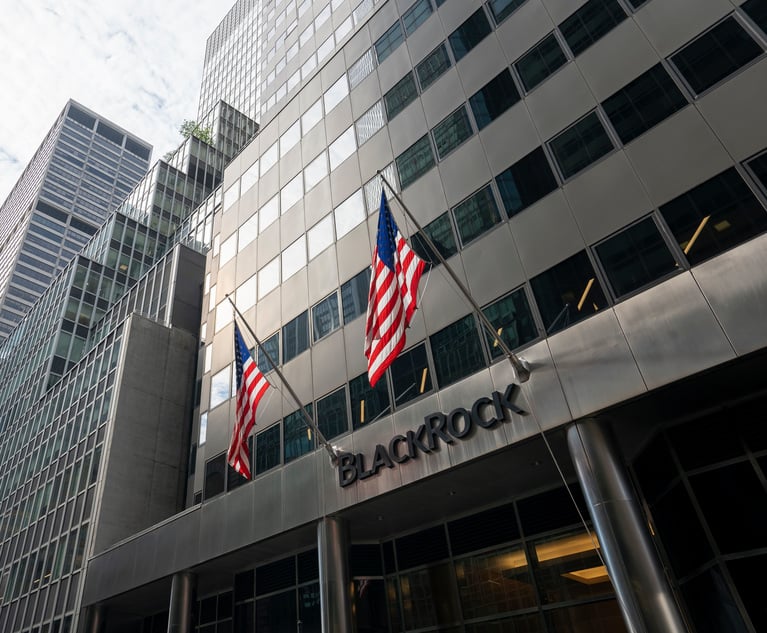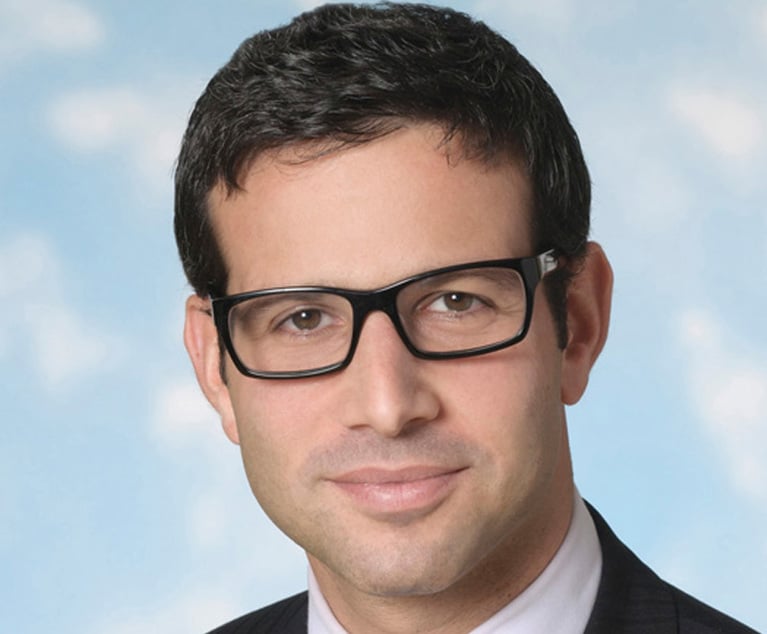Litigation Finance Sector Saw Growth—and Growing Pains—in 2019
Capital continued to stream into funders' coffers, and Burford Capital was often in the headlines, for both good news and bad.
December 22, 2019 at 06:00 PM
5 minute read
 Photo: Shutterstock
Photo: Shutterstock
Litigation finance inched toward the mainstream in 2019, with both lawyers and corporate leaders expressing increasing openness towards taking outside capital to help pursue commercial claims.
But it was an up-and-down year for some of the key players in the industry, which was estimated in November to have $9.5 billion in assets dedicated towards U.S. investments. One publicly traded giant, Burford Capital, saw its stock tumble after it was hammered by a short selling campaign. And a year after Vannin Capital announced that it was shelving its own IPO, the company was instead acquired by a SoftBank subsidiary which then purged its American operations.
Other funders were able to crow about new funds and high-profile advisers coming on board. And Burford also had a triumph in the emerging secondary market for claims.
Here's a closer look at an eventful 2019 for the sector:
Capital Surge: Money managers and investors remain all in, viewing litigation finance as a noncorrelated investment class that can flourish when the stock market and related investments are underperforming.
Several outfits parlayed that enthusiasm into new funds. Channel Islands-based Therium Capital Management tapped three institutional investors, including a sovereign wealth fund, to launch a $430 million fund in March. Burford raised a $300 million fund for post-settlement financing opportunities in April, and IMF Bentham—also traded publicly—raised a $500 million fund to underwrite disputes outside the United States in June.
Meanwhile, Silicon Valley-based Legalist, founded by two Harvard undergraduates in 2016, raised $100 million in its second round of financing and also brought on board former U.S. appeals court judge Richard Posner as an adviser.
Higher Stakes: This influx of capital isn't without consequences.
"It's getting more competitive to get deals done for funders," said Paul Haskel, co-chair of the corporate department at Richards Kibbe & Orbe LLP, explaining that consumers of litigation finance are aware that it's a buyers' market and they are shopping around for the best terms.
That heightens the risk of bad bets for funders, as returns on investments are binary. It becomes even more important to cash in on successful bets to offset the losers, and more stringent terms make that more challenging.
Smaller funds, which lack the ability to pull together diversified portfolios, are facing the biggest risks. "There's a greater risk that one loss will be a catastrophic loss for your business," Haskel said.
Secondary Opportunities: Burford attracted favorable attention in June when it announced it had sold off a 10% share in one of its investments for $100 million. A U.S. Supreme Court decision to not get involved in a dispute between a one-time Argentine-owned petroleum company and a bankrupt investor boosted the value of the case.
Burford CEO Christopher Bogart said at the time of the sale that he was not not aware of any of Burford's peers in the litigation funding space taking advantage of a secondary market for claims.
"It's something that we've been talking about developing for the last several years," he explained. "The funding challenge we have is that capital flows in litigation finance are difficult to predict."
Haskel doesn't expect Burford to be alone in the secondary market for long.
"I can certainly see it as an opportunity to access much greater capital on large deals," he said. "A lot of investors in this funding market came from the distressed debt world. They are certainly accustomed to syndication and this sharing-of-risk architecture."
Selling Burford Short: Shares in Burford, traded on London's AIM exchange for small and businesses, plunged in August after an attack by short-selling investment firm Muddy Waters Research.
Burford hit back, calling Muddy Waters' 25-page report false and misleading, and the company's stock price has largely stabilized after losing roughly half of its value. But in addition to raising questions about accounting and valuation practices and corporate governance at Burford, the debacle sowed doubts about the wider industry, prompting other players to differentiate themselves from their embattled rival.
And Burford has promised litigation against Muddy Waters over alleged market manipulation, indicating the fallout of the fight will spill over into 2020.
Vannin Trouble: Back in 2018, it seemed that the ranks of publicly traded litigation funders was set to grow. Instead, Vannin Capital paused plans for an IPO that September, a move that presaged further challenges.
It appeared the funder had landed a lifeline in September when its sale to global investment manager Fortress Investment Group was announced. But a month later, the SoftBank subsidiary quietly began shuttering Vannin's U.S. operations, along with its presence in Germany.
Fortress explained the step as an "organizational change" designed to take advantage of its own legal assets business. But it also offers an opportunity to speculate about the future: Will 2020 usher in a further shake-up among the players in the industry?
Read More
Amid Buyers' Market, Litigation Funders Find Traction With Smaller Firms
Litigation Finance Users Say They'd Do It Again, Survey Finds
This content has been archived. It is available through our partners, LexisNexis® and Bloomberg Law.
To view this content, please continue to their sites.
Not a Lexis Subscriber?
Subscribe Now
Not a Bloomberg Law Subscriber?
Subscribe Now
NOT FOR REPRINT
© 2025 ALM Global, LLC, All Rights Reserved. Request academic re-use from www.copyright.com. All other uses, submit a request to [email protected]. For more information visit Asset & Logo Licensing.
You Might Like
View All
Who Got the Work: Gibson Dunn and Wilmer to Defend BlackRock in ESG Antitrust Lawsuit
2 minute read
Kirkland's Daniel Lavon-Krein: Staying Ahead of Private Equity Consolidation

Trump's SEC Overhaul: What It Means for Big Law Capital Markets, Crypto Work
Law Firms Mentioned
Trending Stories
- 1Uber Files RICO Suit Against Plaintiff-Side Firms Alleging Fraudulent Injury Claims
- 2The Law Firm Disrupted: Scrutinizing the Elephant More Than the Mouse
- 3Inherent Diminished Value Damages Unavailable to 3rd-Party Claimants, Court Says
- 4Pa. Defense Firm Sued by Client Over Ex-Eagles Player's $43.5M Med Mal Win
- 5Losses Mount at Morris Manning, but Departing Ex-Chair Stays Bullish About His Old Firm's Future
Who Got The Work
J. Brugh Lower of Gibbons has entered an appearance for industrial equipment supplier Devco Corporation in a pending trademark infringement lawsuit. The suit, accusing the defendant of selling knock-off Graco products, was filed Dec. 18 in New Jersey District Court by Rivkin Radler on behalf of Graco Inc. and Graco Minnesota. The case, assigned to U.S. District Judge Zahid N. Quraishi, is 3:24-cv-11294, Graco Inc. et al v. Devco Corporation.
Who Got The Work
Rebecca Maller-Stein and Kent A. Yalowitz of Arnold & Porter Kaye Scholer have entered their appearances for Hanaco Venture Capital and its executives, Lior Prosor and David Frankel, in a pending securities lawsuit. The action, filed on Dec. 24 in New York Southern District Court by Zell, Aron & Co. on behalf of Goldeneye Advisors, accuses the defendants of negligently and fraudulently managing the plaintiff's $1 million investment. The case, assigned to U.S. District Judge Vernon S. Broderick, is 1:24-cv-09918, Goldeneye Advisors, LLC v. Hanaco Venture Capital, Ltd. et al.
Who Got The Work
Attorneys from A&O Shearman has stepped in as defense counsel for Toronto-Dominion Bank and other defendants in a pending securities class action. The suit, filed Dec. 11 in New York Southern District Court by Bleichmar Fonti & Auld, accuses the defendants of concealing the bank's 'pervasive' deficiencies in regards to its compliance with the Bank Secrecy Act and the quality of its anti-money laundering controls. The case, assigned to U.S. District Judge Arun Subramanian, is 1:24-cv-09445, Gonzalez v. The Toronto-Dominion Bank et al.
Who Got The Work
Crown Castle International, a Pennsylvania company providing shared communications infrastructure, has turned to Luke D. Wolf of Gordon Rees Scully Mansukhani to fend off a pending breach-of-contract lawsuit. The court action, filed Nov. 25 in Michigan Eastern District Court by Hooper Hathaway PC on behalf of The Town Residences LLC, accuses Crown Castle of failing to transfer approximately $30,000 in utility payments from T-Mobile in breach of a roof-top lease and assignment agreement. The case, assigned to U.S. District Judge Susan K. Declercq, is 2:24-cv-13131, The Town Residences LLC v. T-Mobile US, Inc. et al.
Who Got The Work
Wilfred P. Coronato and Daniel M. Schwartz of McCarter & English have stepped in as defense counsel to Electrolux Home Products Inc. in a pending product liability lawsuit. The court action, filed Nov. 26 in New York Eastern District Court by Poulos Lopiccolo PC and Nagel Rice LLP on behalf of David Stern, alleges that the defendant's refrigerators’ drawers and shelving repeatedly break and fall apart within months after purchase. The case, assigned to U.S. District Judge Joan M. Azrack, is 2:24-cv-08204, Stern v. Electrolux Home Products, Inc.
Featured Firms
Law Offices of Gary Martin Hays & Associates, P.C.
(470) 294-1674
Law Offices of Mark E. Salomone
(857) 444-6468
Smith & Hassler
(713) 739-1250











